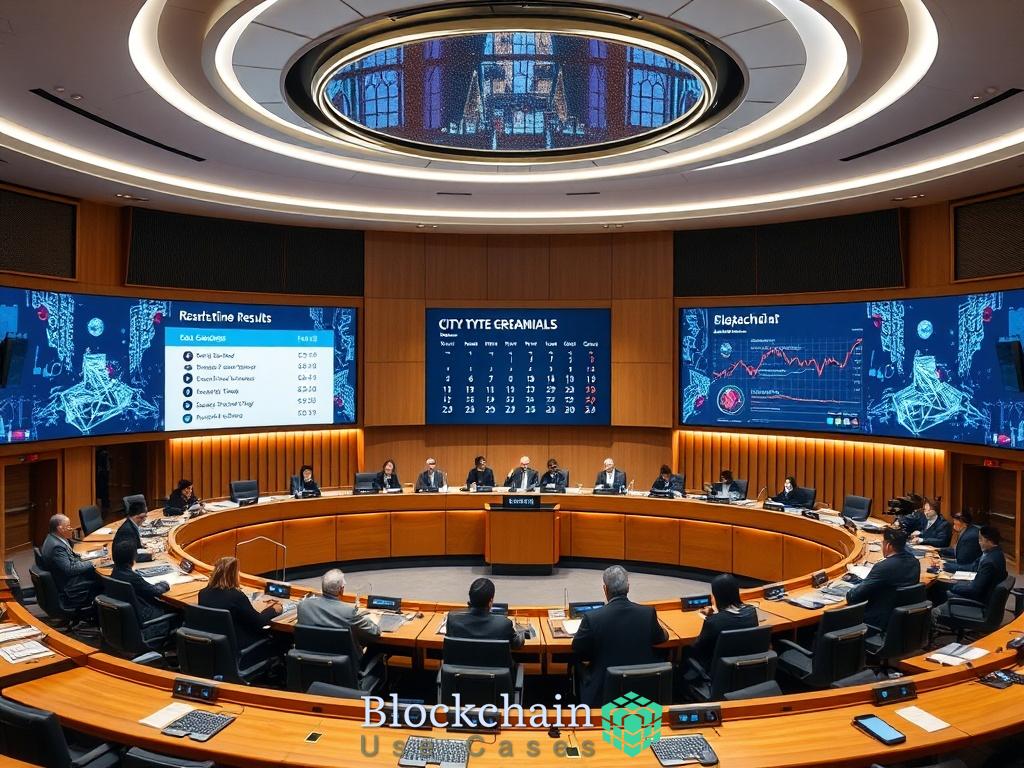Enhancing Voting Integrity through Blockchain Technology
As cities grow and evolve, so too do the complexities surrounding governance and voting procedures. The traditional methods of managing city council votes are often plagued with issues such as lack of transparency, susceptibility to fraud, and inefficiencies. By integrating blockchain technology into the voting process, municipalities can not only enhance the integrity of elections but also foster greater trust among constituents. This article explores how blockchain can revolutionize voting integrity and the benefits it brings to city councils.
Blockchain technology, characterized by its decentralized and immutable nature, presents a groundbreaking solution to the challenges of traditional voting systems. Each vote can be recorded as a block in the chain, ensuring that it is tamper-proof and transparent. This shift not only provides a reliable method for tracking votes but also enhances public confidence in the electoral process.
- Decentralization: Reduces the risk of single points of failure and manipulation.
- Immutability: Once a vote is recorded, it cannot be altered or deleted.
- Transparency: All transactions are visible to authorized parties, ensuring accountability.
Implementing blockchain technology in city council elections requires careful planning and execution. Municipalities must ensure that all stakeholders are educated on the new system, and robust cybersecurity measures must be in place to protect voter data. Additionally, pilot programs may be necessary to iron out any potential challenges before full-scale adoption. The future of voting integrity lies in the successful integration of these advanced technologies, paving the way for a more transparent and accountable governance model.
Real-Time Transparency in Council Voting Processes

In an era where public trust in governmental processes is at an all-time low, the integration of blockchain technology into city council voting presents a beacon of hope. By facilitating real-time transparency, blockchain not only empowers constituents but also redefines the very concept of civic engagement. As municipalities grapple with the challenges of outdated voting systems, the adoption of this innovative solution can transform how citizens perceive and interact with their local governance.
One of the most significant advantages of utilizing blockchain in council voting is the ability to provide immediate access to voting outcomes and processes. Unlike traditional systems where results may take days to finalize, the decentralized nature of blockchain allows for instantaneous updates. Each vote, once cast, is recorded in real-time, making it possible for stakeholders to track the progress of decisions as they unfold. This immediacy not only enhances the efficiency of the voting process but also assures citizens that their voices are heard without delay.
Accountability is a cornerstone of democratic governance, and blockchain technology excels in this regard. Each vote recorded on the blockchain is immutable, meaning it cannot be altered or deleted once entered. This feature creates a secure audit trail that can be verified by any authorized party, thus eliminating concerns about vote tampering or miscounts. Such a system fosters a culture of responsibility among council members, as they know their decisions are permanently documented and subject to public scrutiny. The implications of this are profound; with enhanced accountability, council members may be more inclined to act in the best interest of their constituents, knowing that their actions are permanently recorded.
Real-time transparency not only benefits the voting process but also encourages a more engaged citizenry. When constituents have access to live updates and results, they can better understand the decision-making processes that affect their lives. This transparency cultivates a sense of ownership among citizens, as they feel more connected to the outcomes of council votes. As municipalities begin to adopt these blockchain systems, they can expect a surge in public interest and participation in local governance. The shift towards a more engaged citizenry will ultimately lead to more informed decision-making and a stronger democratic process.
Decentralized Record Keeping for Public Accountability
The necessity for transparent governance has never been more critical, especially as citizens increasingly demand accountability from their local leaders. Traditional voting procedures often lack the robust mechanisms needed to ensure that public decisions are both recorded and accessible to constituents. However, by embracing a decentralized approach to record keeping through blockchain technology, city councils can significantly enhance public accountability and build trust within the community.
Empowering Citizens with Immutable Records
In the realm of municipal governance, the concept of immutable records is a cornerstone of public trust. Blockchain technology ensures that once a vote is cast, it becomes part of an unchangeable ledger. This characteristic not only protects against tampering but also enhances verification processes. Citizens can independently verify the voting outcomes, thus fostering a sense of ownership and engagement in local governance. When constituents have confidence that their votes are securely recorded, it encourages more active participation in future elections.
Transparency as a Tool for Accountability
The introduction of decentralized record keeping transforms the role of accountability in city council operations. Each decision made is logged in a transparent manner, allowing for public scrutiny. Unlike conventional systems where records may be obscured or manipulated, blockchain provides a clear view of how votes were cast and the rationale behind decisions. This level of transparency acts as a deterrent against unethical behavior and misconduct among council members, ensuring that they remain answerable to the constituents they serve. Furthermore, the ability for real-time access to voting records empowers citizens to hold local leaders accountable for their actions.
A Comparative Insight into Traditional vs. Blockchain Voting
The contrast between traditional voting mechanisms and blockchain-based systems illustrates the advantages of the latter. Traditional systems often rely on centralized databases which can be vulnerable to hacking, mismanagement, or human error. In contrast, blockchain’s decentralized nature ensures that records are distributed across numerous nodes, making them less susceptible to corruption or failure. This reliability not only assures citizens of the integrity of their votes but also enhances the overall efficiency of the voting process.
| Feature | Traditional Voting | Blockchain Voting |
|---|---|---|
| Data Integrity | Vulnerable to tampering | Immutable records |
| Transparency | Limited access to voting data | Real-time public access |
| Public Accountability | Often obscured | Enhanced through verification |
In summation, the integration of decentralized record keeping through blockchain technology represents a transformative shift in how city councils can approach voting procedures. By establishing a system that prioritizes accountability and transparency, municipalities can not only improve trust among constituents but also foster a more engaged and informed citizenry. As cities continue to evolve, embracing these innovative solutions will be pivotal in shaping the future of democratic governance.
Smart Contracts for Automated Voting Procedures
The advent of blockchain technology heralds a new era in civic governance, particularly in the realm of city council voting. Among the most transformative features of blockchain is the capability to implement smart contracts, which can automate and streamline voting procedures. By minimizing human intervention and enhancing precision, smart contracts represent a significant leap forward in ensuring that the voting process is not only transparent but also efficient and reliable.
Smart contracts function as self-executing agreements with the terms of the contract directly written into lines of code. This innovation allows for the automation of various aspects of the voting process, reducing the potential for human error and ensuring compliance with predetermined rules. For city councils, this means that every stage of the voting procedure— from pre-vote preparations to the final tally— can be executed automatically, based on the established criteria.
Utilizing smart contracts for municipal voting introduces several noteworthy advantages, which can be summarized as follows:
- Efficiency: Reduces time spent on administrative tasks by automating processes.
- Cost-Effectiveness: Lowers operational costs associated with traditional voting methods.
- Accuracy: Minimizes the risk of errors that can occur through manual handling.
- Security: Enhances the security of votes through cryptographic measures, making tampering nearly impossible.
- Accessibility: Facilitates easier access for voters, allowing them to participate in the voting process remotely.
The transition from traditional voting methods to blockchain-enabled smart contracts can be illustrated through a comparative analysis of key attributes:
| Feature | Traditional Voting | Smart Contract Voting |
|---|---|---|
| Execution | Manual intervention required | Automated execution |
| Speed | Prolonged counting and verification | Instantaneous results |
| Security | Vulnerable to tampering | Highly secure with cryptography |
| Cost | Higher operational costs | Lower costs due to automation |
By embracing smart contracts, city councils can not only enhance the efficiency and integrity of their voting processes but also foster a culture of transparency and trust among constituents. The automation of voting procedures through smart contracts represents a significant step towards a more accountable and responsive governance structure.
Challenges and Solutions in Implementing Blockchain for Voting
The integration of blockchain technology into city council voting procedures promises enhanced transparency and accountability. However, the journey toward implementation is fraught with challenges that municipalities must address to realize the full potential of this innovative solution. From technological hurdles to public perception, understanding these challenges is the first step in paving the way for successful adoption.
As cities embark on the transition to blockchain-based voting systems, several obstacles may arise. Addressing these challenges involves a thorough understanding of both the technical and social dimensions of the implementation process. Below are some of the most pressing challenges:
- Technological Infrastructure: Many cities lack the necessary technical infrastructure to support blockchain systems, which can lead to significant implementation delays.
- Cybersecurity Concerns: Despite blockchain’s inherent security features, the risk of cyber attacks still looms, necessitating robust measures to safeguard sensitive voter data.
- Public Awareness and Trust: A lack of understanding about blockchain technology among constituents can create skepticism and resistance to its adoption.
- Legal and Regulatory Frameworks: Existing laws and regulations may not adequately address blockchain voting, posing potential legal hurdles that need to be resolved.
To overcome these challenges, municipalities can adopt a multi-faceted approach that combines technological advancements with community engagement. The following strategies can facilitate a smoother transition to blockchain voting:
- Invest in Infrastructure: Cities should prioritize upgrading their technological frameworks to support blockchain systems, ensuring that all necessary components are in place before implementation.
- Enhance Cybersecurity Protocols: Adopting advanced cybersecurity measures, such as encryption and regular audits, will help protect voter data and maintain trust in the system.
- Engage the Community: Conducting public education campaigns can demystify blockchain technology and foster a culture of trust and participation among constituents.
- Collaborate with Legal Experts: Working with legal professionals can help municipalities navigate existing laws and develop new regulations that accommodate blockchain voting.
By addressing these challenges head-on, city councils can lay the foundation for a successful implementation of blockchain technology in voting procedures, ultimately leading to a more transparent, accountable, and trustworthy democratic process.





